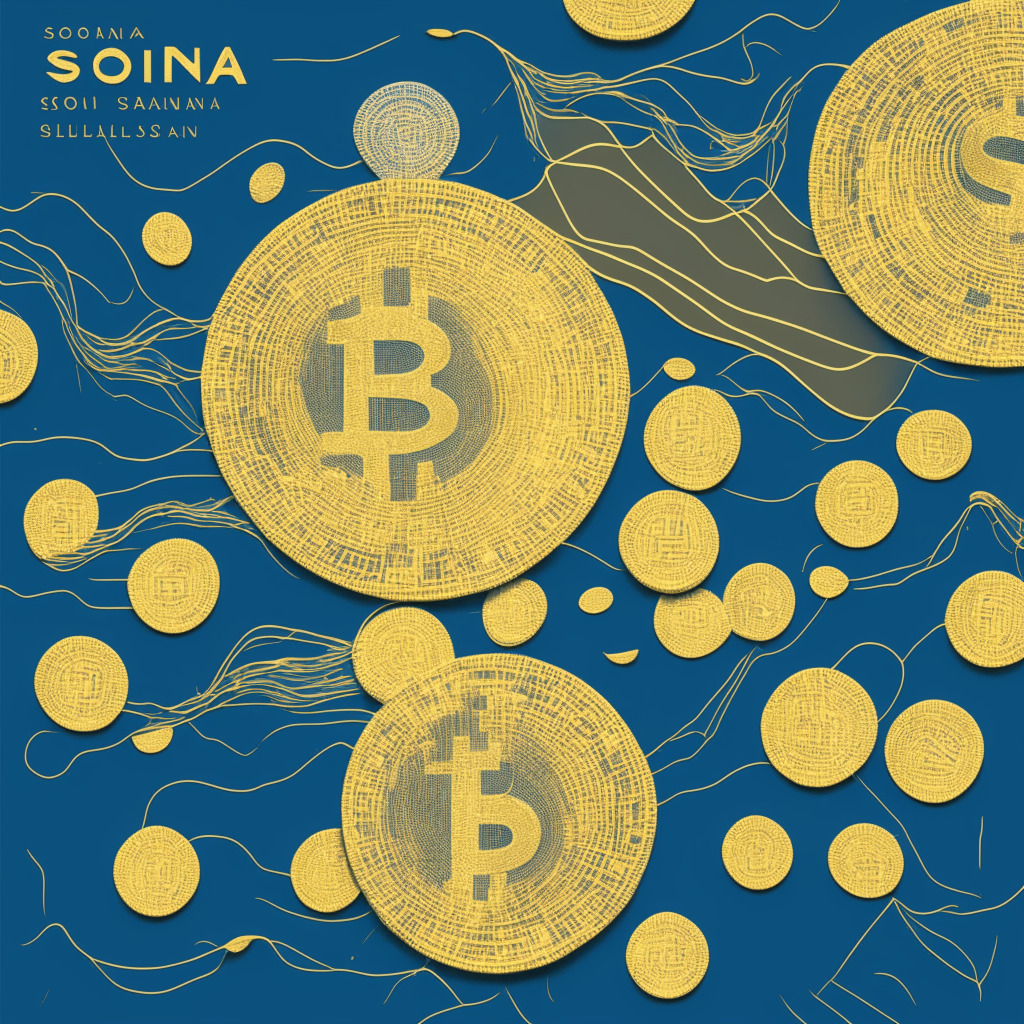Gracy Chen, MD at crypto exchange Bitget, suggests KYC measures might get stricter with users undergoing ID verification perhaps more than once a year. Incorporating biometrics such as facial recognition, fingerprints, or iris scans, into KYC procedures is also gaining traction. Bitget has made KYC mandatory, reflecting a trend in crypto industry’s commitment to transparency and anti-fraud regulations. Chen also stresses the importance of balancing security and privacy, highlighting the role AI can play in enhancing AML capabilities.
Search Results for: hacking
Suspicious $27M Crypto Movement from CoinEx: Hack or Inside Job?
“$27M worth of crypto was moved from CoinEx hot wallet to an unrecorded Ethereum account, raising suspicions of a potential security breach or inside job. The incident raises questions about the efficacy of current cybersecurity measures in the digital currency sphere.”
Examining the ENS ‘Hack’: A Deception or Crypto Security Wakeup Call?
“Cybersecurity expert Dominic Alvieri recently asserted that Ethereum Name Service (ENS) was hacked, with claimed extracted data including usernames, hashed passwords, and more. However, skepticism has arisen as the alleged sensitive data seems to be simply publicly available information. This event underscores the strength of decentralized systems against cybersecurity threats.”
Ethereum Co-founder’s SIM Swap Attack: An Alarm for Crypto Security Measures?
Ethereum co-founder, Vitalik Buterin fell victim to a “SIM swap” attack, losing over $691,000 due to a fraudulent NFT promotion. The incident has shed light on the security flaws associated with phone numbers being linked to social accounts. Decentralized identity control systems could potentially offer a solution to this escalating issue.
Ethereum Co-founder’s Twitter Breach: An Eye Opener on SIM-swap Attacks, Crypto Security & Lessons Learned
“Ethereum co-founder Vitalik Buterin’s recent Twitter account breach resulted from a SIM-swap attack. This hacking method bypasses two-factor authentication, revealing a glaring weak link in our security: our phone numbers. The event highlights the risks associated with using phone numbers for authentication, urging the need for improved security practices to safeguard crypto investments.”
Decoding DeFi: Navigating the Maze of US Regulations and the Promising Blockchain Future
“The US DeFi landscape hit an inflection point as the CFTC filed lawsuits against three companies, accusing them of offering financial products without proper registration. Amidst ambiguity, questions arise about DeFi’s future in the US, regulatory hurdles, and potential to revolutionize world finance. Undoubtedly, for DeFi to truly flourish, regulatory clarity and a willingness to embrace the evolving landscape is crucial.”
The Evolution of Cross-Chain Interoperability: A Game-Changer or a Destined Failure?
“Blockchain networks may face growth obstacles due to “chain tribalism”, resistance to cross-chain collaboration. However, a shift towards chain interoperability, or different blockchains interacting, is expected by 2023. Notable upcoming developments aim to enhance this interoperability, although existing methods risk security breaches and require improvement.”
Ethereum Co-Founder’s Hack: Unveiling the High Stakes of Crypto Security
“The Buterin hacking illustrates the immense risk and trust issues in cryptocurrency handling. While decentralization brings transparency and security to systems, it doesn’t entirely remove the threat of cyber attacks. These incidents underscore the importance of robust security mechanisms and fosters awareness about vulnerabilities.”
North Korean Lazarus Group’s $41M Crypto Casino Heist: A Detailed Examination
The FBI has identified North Korean hacking group, the Lazarus Group, as responsible for the theft of $41 million from online crypto casino Stake. The large-scale cyber theft affected multiple blockchain networks including Ethereum, BNB Chain, Bitcoin, and Polygon.
Unmasking Crypto-Mining Attacks: Hackers, Graphic Design Tools, and the Art of Stealth Mining
Cisco Talos Intelligence Group found hackers use a Windows tool, Advanced Installer, to package malicious crypto-mining code with software installers of common design tools. Affected computers become carriers for malware miners, their powerful GPUs exploited to mine cryptocurrencies on behalf of the hackers, indicating increasing intersection between technological evolution and cybersecurity threats.
State-Sponsored Crypto Heists: A Deep Dive into the Threat of North Korea’s Lazarus Group
“The North Korea-affiliated Lazarus Group has allegedly stolen $41 million in crypto from Stake.com, according to the FBI. Using a leaked private key to a hot wallet, the loot spread across Ethereum, BSC, Polygon, and Bitcoin networks. These hacking events highlight the crypto industry’s vulnerability and necessity for effective security measures.”
Reshaping America’s Financial Future: The Digital Dollar Dilemma and Road to CBDC Regulation
The House Financial Services Committee is preparing to discuss the implications and regulation of a digital dollar or Central Bank Digital Currencies (CBDCs), along with private sector alternatives. This conversation, following various states erecting legislative boundaries for CBDCs and $41 million hacking of a crypto site, underlines the need for balance between innovation and robust regulatory frameworks.
Custodial vs Non-Custodial Crypto Wallets: A Balancing Act of Convenience and Security
“The article debates the merits of custodial versus non-custodial wallets in cryptocurrency. Custodial wallets, managed by third parties, offer simplicity but present security risks. Non-custodial wallets provide total control, upholding cryptocurrency’s core ethos of decentralization but with less convenience. The choice involves balancing security, control, and services.”
Storm Brewing: Tornado Cash and the Controversy of Blockchain Legality
Co-founder of Ethereum-based “crypto mixer” Tornado Cash, Roman Storm faces severe charges including money laundering and sanctions violations. The charges are closely tied to Tornado Cash’s operations and the allegedly connected North Korean hacker group, Lazarus Group – further leading to international sanction violations complications.
Balancing Act: Ethereum’s Quest for Privacy, Regulation, and Decentralization with Privacy Pools
Ethereum’s co-founder, Vitalik Buterin, leads a privacy protocol initiative, ‘Privacy Pools,’ employing zero-knowledge proofs to verify user funds legitimacy, preserving transactional privacy. The protocol aims to create a separation that filters out funds related to criminal activities, harmoniously balancing financial privacy and regulation.
South Korean Crypto Sentiment: Investment or Gambling? Public Perspective & Future Predictions
A recent South Korean survey reveals 80% of respondents view cryptocurrencies more as “gambling” due to lack of asset support, susceptibility to scams, price manipulation fears, and insufficient regulatory supervision. While 6% reported understanding underlying blockchain technology, most demonstrated partial or no comprehension, primarily investing for fun or quick gains.
Unraveling Blockchain: Introducing Privacy Pools for Enhanced Security and Compliance
Vitalik Buterin and his co-authors introduced novel “privacy pools” in blockchain, addressing privacy issues and crime associated with privacy mixers. These pools utilize zero-knowledge technology to separate honest transactions from unlawful activities, encouraging transparency and honesty in this digitally decentralized environment. The future of blockchain looks promising yet challenging with regard to privacy and regulatory compliance.
Ethereum-based Wallet Scams: The Dark Side of Crypto Convenience or Heightened Awareness Call?
“Scammers exploit MetaMask’s reputation by redirecting users to fake websites via official government website URLs. Unwary users link their MetaMask wallets to these hoax sites, inadvertently giving fraudsters control over their assets. Despite MetaMask’s efforts, such scams have left crypto enthusiasts questioning their holdings’ security.”
Solana’s Irresistible Appeal: Bucking the Crypto Outflow Trend Despite Stagnant Prices
“Despite broader crypto market outflows, Solana has sustained consistent inflows for the past nine weeks. While promising developments provide a bullish sentiment, a disconnection between investment inflows and price performance presents a sobering counter-narrative. Risks exist within the crypto spaces, such as hacking episodes.”
Dismantling North Korea’s Crypto Power: A Bold South Korean Stance Against Cybercrime
“South Korea has reportedly drafted a bill to neutralize North Korea’s crypto assets, aiming to cripple Pyongyang’s illicit weapons program. The bill proposes tracking and neutralizing stolen digital assets, offering potential benefits despite raising concerns about decentralization and anonymity in the cryptocurrency world.”
Blockchain Revolution in Traditional Asset Trading: The London Stock Exchange Leap and Its Implications
London Stock Exchange (LSE) Group is aiming to revolutionize traditional asset trading with the incorporation of blockchain technology. This new system proposes a smoother, cheaper, and more transparent process for handling traditional assets, ensuring reliability for investors. However, the integration faces hurdles, including security concerns and effectiveness of legacy systems with new technologies.
NFT God’s Recovery Journey: A Tale Of Theft, Vigilance and The Shift In Market Dynamics
Crypto personality, NFT God, managed to recover part of his digital assets, originally stolen in a hacking incident, thanks to Binance’s security team. The incident highlights both the risks within the digital marketplace and the ongoing need for enhanced cybersecurity vigilance for anyone involved in crypto and NFT trading.
Unveiling the Crypto Conundrum: Rising Popularity Amidst Alarming Security Breaches
The surge in cryptocurrency popularity carries risks, as $16 million worth crypto was lost due to hacks in August alone. Alarmingly, the losses expanded to $23.4 million, including fraud. These incidents targeted decentralized finance (DeFi) protocols across various blockchains, highlighting the need for improved security measures. The path to DeFi, while promising, remains fraught with risks.
Navigating the Promise and Perils of a Blockchain-Powered Future
“Blockchain technology presents unprecedented opportunities and potential pitfalls, transforming sectors like finance and supply chains, and democratizing financial access. However, there are security risks, regulatory challenges and concerns over data misuse and environmental impacts. Effective methods to capitalize this technology while mitigating risks are crucial.”
Riding the Digital Wave: Reliance Industries, Blockchain & CBDCs – Bold Innovation or Risky Move?
“Reliance Industries Ltd. plans to venture into blockchain platforms and central bank digital currencies with its new entity, Jio Financial Services. Despite possible risks and uncertainties, the company aligns with India’s digital financial future, emphasizing security and regulatory adherence.”
Weathering the Storm: How Exodus Survives and Thrives Amid Crypto Ebb and Flow
“Despite a bearish market, multichain wallet Exodus reported Q2 2023 revenue of $12.4 million, a modest 4% dip year-over-year. Notable was a strong fiat onboarding revenue increase, up 220% from 2022. High trade volumes came from Bitcoin, Tether and Ether. Strikingly, Exodus alleviated some financial stresses by drastically cutting administrative and marketing budgets by 65%, resulting in administrative expenses shrinking to 32.2% of revenue.”
KYC Regulations vs Permissionless Money: The Crypto Crossroads Unveiled by Tornado Cash Crisis
“The recent arrest of Tornado Cash founders has raised questions about the coexistence of KYC regulations and permissionless money. With platforms like Bitcoin’s Lightning Network and MetaMask allowing near-traceless transactions, the intrusion of KYC challenges the decentralization and anonymity that cryptocurrencies offer. This situation brings the future of crypto at a crossroads between regulatory vigilance and sector’s initial ethos.”
Tornado Cash Controversy: Balancing Blockchain Privacy and Regulatory Oversight
The US Department of Justice has accused Tornado Cash’s developers of facilitating money laundering and sanctions violations through their Ethereum-based privacy protocol. This situation raises concerns over the delicate balance between financial privacy, integral to crypto and blockchain technology, and regulatory oversight to prevent illicit transactions. The outcome will significantly impact the future of blockchain development.
Unmasking the Hermit Kingdom’s Crypto Heists: Blockchain Security vs Cyber Criminals
“The digital fortress of cryptocurrencies faces a possible breach by notorious North Korean hacker groups, Lazarus and APT38, suspected of planning to liquidate over $40 million in stolen BTC. North Korea’s increased cyber involvement, amassing $2 billion in crypto loot over five years, raises concerns about the security of the cryptocurrency framework and necessitates vigilance from crypto firms and individual investors.”
Tornado Cash Founders Charged: A Blow for Privacy or Triumph for Law Enforcement?
“Roman Storm and Roman Semenov, key figures of Tornado Cash, are facing charges for helping North Korea’s Lazarus Group launder over $1 billion via a privacy mixer. This incident sparks debate on blockchain privacy protections being exploited by criminals versus the potential shortfalls of legal jurisdiction in regulating such abuses.”
Navigating the Crypto Winds: The Highs, Lows and Ambiguities in Blockchain’s Future
“Unstoppable Domains has unveiled Unstoppable Messaging, a product of the Web3 messaging network XMTP. Meanwhile, Binance.US has paired with MoonPay to allow customers to convert USD into tether (USDT) amidst their comeback from a dollar deposit suspension. Despite advancements, cybersecurity challenges persist in the blockchain world.”
Atomic Wallet Hack 2023: Unravelling the Crypto Security Dilemma Amid Rising Concerns
“The Atomic Wallet incident resulted in losses of a considerable $100 million, with recent accusations implying a Ukrainian group’s involvement. The breach situation is vague, with potential causes ranging from malware, an internal breach, to a man-in-the-middle attack. This highlights the crypto industry’s insecurity and the need for comprehensive security measures and regulation.”































